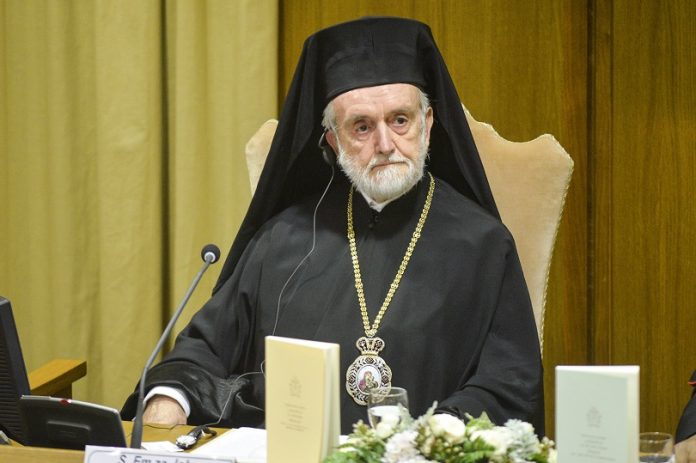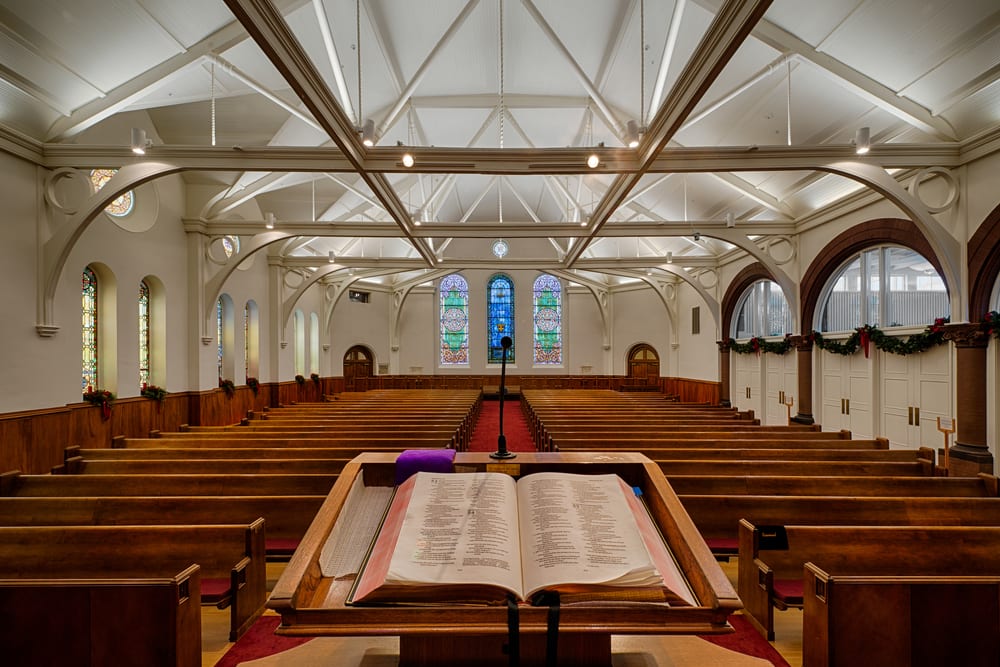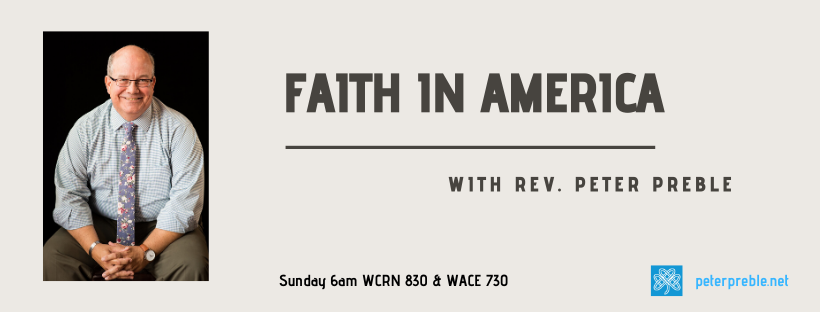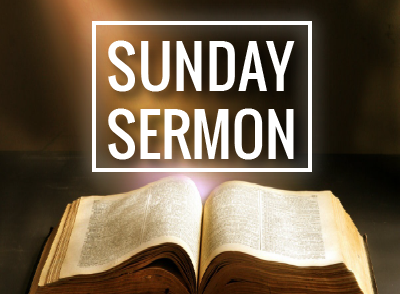Interview: Metropolitan of Pergamon John Zizioulas with Public Orthodoxy (23 March 2020)

We wish to hear your views on the current situation, since your theology plays a great role in the present circumstances.
Metropolitan John: My theology, unfortunately, cannot be applied. In Greece, they have already closed the churches, and the Divine Liturgy is not being served. Is it served in Serbia?
Taking into consideration the decision of the government that the number of people in one place be limited, as well as the issue of getting around and social distancing, the Patriarch Irinej’s newest decision is that services be held in churches but without more than five people.
Metropolitan John: That’s acceptable.
In America, it was decided that the priest, chanter and altar server be present, in order for the Liturgy to be served, so that they might have the holy mysteries in order to commune the people. What do you think about that?
Metropolitan John: For me, the Church without the Holy Eucharist is no longer the Church. On the other hand, the danger of transmitting this virus to others imposes on us the need of doing whatever is necessary, even if that means closing the Church. The Greek government has taken drastic measures due to the very serious matter at play.
Many have posed the question: What does John Zizioulas say? Since everyone knows that you had once said that in Orthodoxy a “private” Liturgy doesn’t exist.
The liturgy under the current conditions will be served for the life of the world. One priest will serve in order to allow the people to take communion. Let us not forget, the Liturgy is served “for those who are absent with good reason.” Those, who cannot come, are now everyone. I think it is an acceptable decision that a priest serves the liturgy in the church with two or three people. How he will forbid others from attending, I don’t know. I think the best decision, instead of completely closing the church, is to have the priest serve with up to five people. Therefore, the Liturgy should be served in churches, but the possibility of spreading the virus should be reduced to zero.
The Church of Greece will broadcast the Holy Liturgy via the Internet. Some in America will do the same. What is your opinion?
I don’t agree with the Divine Liturgy being transmitted by television. I’m confined to my home and will not be able to attend Liturgy. However, I will not turn the television on in order to watch the Liturgy. I consider that an expression of impiety. It is impious for someone to sit and watch the Liturgy.
We heard that the faithful in Greece will follow the Liturgy on television. Where will the Liturgy be served?
Metropolitan John: I think it will be televised from the Cathedral church of the Archdiocese of Athens. Personally, as I said, I don’t like the Liturgy to be broadcasted on a TV channel. In Greece, there is at least that one liturgy that will be served in the Cathedral church. In my opinion, it could have been served in more churches, but there is the fear of spreading the disease.
At the Liturgy one is either present or not present, we have already read this in your writings. What can Christians do on Sunday morning when they are prevented from attending Liturgy in a church and they have to stay at home? What would you suggest Christians under these current circumstances do?
Metropolitan John: Let a person remain at home and pray. The Church can prepare some service texts to encourage the faithful to read, for instance, the morning service in their homes, but not to read the text of the Liturgy. The Liturgy requires our presence. One cannot participate in the Liturgy from a distance. Therefore, let the faithful pray from their homes.
When you say “prayer,” what do you mean specifically? To read those prayers they know or to have the bishops and priests recommend them something?
Metropolitan John: The Dioceses can recommend a prayer rule; in my opinion, the Orthros (Sunday Matins) is sufficient. The Church should distribute the text for Orthros, for instance, in order for the faithful to read them at their homes during the time the Liturgy is being served. A televised broadcast of the Liturgy is not the right thing to do. On the other hand, a good solution is to have the Liturgy served by a priest and two or three people and, if possible, to distribute Holy Communion to the faithful. As far as I know, this is difficult now since we don’t have deacons who could deliver Communion. In the ancient Church Holy Communion was taken to those who were unable to attend. Thus, if this doesn’t exist, let the Liturgy be at least with five people.
What do you recommend to the faithful concerning individual (private) prayers of each Christian?
Metropolitan John: The faithful should continue to pray, to offer their personal petitions to the Lord.
What would you call this state and this situation, since it is now extraordinary? You said that the Church without the Eucharist is not the Church and that the Eucharist must be preserved. This type or form of the Eucharist, what would you call it, that it not be turned into a “private“ rite?
Metropolitan John: If there are five people at the Liturgy it is no longer a private Liturgy. It is important that those who attend are not in danger and cannot endanger others.
As for the danger, however, no one can say that there is no danger in the matter of transmission.
Metropolitan John: As doctors tell us, the danger is minimized if distance is maintained and hygiene measures are observed.
Therefore, it is excluded that the Eucharist can be reduced to a private matter. If the Liturgy is performed in the presence of several believers, is this danger avoided?
Metropolitan John: It is better than having fully closed Churches.
Some believe that in this case of limited participation of the faithful, the Church no longer exists as a Eucharistic community and assembly, and therefore they say that the Eucharist should not be performed. And they add: if it is not done at all (which is beyond our will and desire) then God will not leave us. So, they ask: if we do not have a church community assembled, why should we serve such a “limited” Liturgy?
Metropolitan John: A community (κοινωνία and κοινότητα) is never complete in terms of the participation of the entire community. There is always a minority present; however, it still represents and acts on behalf of all those who are absent. And of course, we pray for all those who are “absent for a reasonable cause,” i.e. who were prevented from attending. This is not a novelty in our Church. There have always been those who are absent from the Liturgy. Those who participate in it pray for those who are absent. As we know, some may be absent because they are ill or because they are on the road. However, one may also be absent because the state does not allow him or her to attend due to an emergency. There is no substantial problem here because there is a community or a congregation of those few. It is better to have a community of a few than a state where there is no one in the Eucharistic assembly.
Some believe that those who participate in this three- or four-member liturgy are “privileged” and thus more favored than others?
Metropolitan John: What does “privileged” mean? Those who are present would very much like others to be present but are aware that they cannot. They do not look at it with exaltation or satisfaction that there are no others. They are aware that they represent those who are absent.
The dilemma some have is whether to deprive ourselves of the Holy Eucharist and thus help others (stopping the spread of the infection) or to serve the Eucharist in the hope that it will not harm others. Is it sufficient to comply with all measures to prevent the transmission of the infection?
Metropolitan John: We should prevent the spread of the infection because it is a huge risk of transmitting the virus. Not only to those who are in our immediate vicinity but also to those who are further away. This is spread throughout society and why should we be the cause of such a spread of the virus?
Does the image of the Liturgy we now have, where it is confined to several believers around the priest, violate liturgical iconism? Does this limited gathering continue to iconize the Kingdom of God, which is the meaning of the Liturgy?
Metropolitan John: The small community does not diminish the image (iconization) of the future Kingdom. Very often, in many countries in Europe, I went to parishes whose temples were used by very few Orthodox believers. Yet the entire Holy Eucharist is offered for all the universe. A parish represents not only the local community but also the entire Catholic Church. Therefore, the smallest temple represents the universe and summarizes the whole world.
Many fear that some elitism does not emerge from this state: those who are privileged in the Liturgy. Do you see any danger in that?
Metropolitan John: No, I see no danger.
In what sense?
Metropolitan John: It is enough for the local bishop or priest to allow an alternative presence so that the same parishioners do not always come. This week there are three or four, next week there will be another three or four faithful. The participation of others will be gradually made possible until this situation is over.
Many people put it this way: it is not a question of whether the Church exists without the Eucharist, but whether faithful can refrain from participating in the Eucharist for a month or two. There is a view that we should not serve now because it is such a situation. Liturgies were abolished in some dioceses, where state authorities ordered a ban on gathering at the Liturgy. The bishops had to completely prevent the participation of believers, as in Greece. Are you satisfied with the decision in Greece that the Liturgy cannot be served until the end of the pandemic?
Metropolitan John: I don’t think that’s good. I believe that they could find another solution where the liturgy could be celebrated with the small participation of laypeople. They chose that solution, but I do not think it was the best one. The decision not to attend the Liturgy could have been avoided.
If this happens in the whole world, what do you think, would the Church cease to exist then?
Metropolitan John: It is just a hypothesis. I do not think in reality that can happen. There will always be people who serve the Liturgy, for example, in monasteries.
Some say it only “keeps the flames going” (eucharistic flame) which is a nice, poetic image. Is that the theological and substantive answer?
Metropolitan John: That’s not the answer. Whenever something is not our choice but a necessity that comes from the outside then we do what is called an oikonomia. A lot of things are not quite right in practice, but since what is right cannot be valid, then we accept it only as oikonomia. And here we have just that today: we apply oikonomia things to deal with one serious problem. I view this as a measure of oikonomia.
You said and wrote that in ecclesiology it is not only taking Communion of the sacred gifts (communio in sacris) that is crucial, but also participation in the community of the saints (communio sanctorum). Some forget that we do not merely distribute some “thing” from the Holy Altar which is taken and absorbed in the organism, but that with communion, we participate in the community of all of the Saints. What can you say on this topic during this era of the coronavirus?
Metropolitan John: That community of Saints certainly exists, even when there is a small number of faithful and laity. It is the community of Saints, and not merely a community in a sanctuary.
Do you have any comments on the manner of receiving communion? I assume that you have heard the current arguments on this topic. While some insist on giving communion from the same spoon, others are searching for other ways, in order to respond to the challenges of the epidemic and show their social responsibility. One of the local Churches ordered mandatory spoon disinfection, while another began using disposable spoons. What do you say? What oikonomia or dispensation should be applied here?
In the Liturgy of St. James the Brother t the faithful take communion separately, the Body separate from the Blood of the Lord. As we know, according to the order of this ancient liturgy, these are not both placed in the chalice. There are, therefore, various ways. I don’t agree with having disposable spoons for each person. I don’t think this is good. Instead, it is better for the faithful to receive the Body of Christ which would have been dipped in the Blood of Christ beforehand. In this manner, the spread of the virus will be avoided. This is an ad hoc answer, of a provisional character. But I think ways can be found. Although the Church has not given much thought to other ways, I think it should do so.
Communing with a spoon dates back to the 11th or 12th century?
Metropolitan John: Yes. This is a considerably later practice and I think, at least temporarily, we should go back to the ancient solutions. I believe we will discover them. But who thinks of them today!?
Some have suggested the following solution. Priests should prepare the particles of the Body of Christ from the Lamb and then steep the particles with the Blood of Christ. Then the people approach and take that Communion. What do you think of that?
Metropolitan John: I think this is a very good solution, since there is already fear among a group of faithful. Personally, I would like and desire that the faithful have no fear (from the Holy Communion). I consider that the Body and Blood of Christ is truly the receiving of medicine immortality and I don’t think it is dangerous. Personally, it wouldn’t bother me to commune from one chalice during an epidemic or, even to use one common spoon. However, since there are those who, as the Apostle Paul says, are weak in faith, we must avoid scandalizing them. The Church must find a solution for them as well, to meet their needs, in order to avoid accusations that we Christians transmit infections or disease.
We notice that you consider that accusation, or testimony, which comes from outside the Church to be important. Do you think that the Church should be careful what image or impression it has on the world?
Metropolitan John: With the prevailing practice of taking Communion, I think that, in the event this disease spreads, many will accuse Christians of being guilty and many will say that the Church spread the infection.
Is there a responsibility of the Church towards society and creation?
Metropolitan John: There certainly is.
Your Eminence, we owe you much gratitude for this conversation. It is wonderful that our readers will have the opportunity to see your answers to these current issues.
Metropolitan John: I hope the one who reads this will read it correctly and not misinterpret me. I pray that the Lord helps us deal with this situation in the right way.
Translated from Serbian by Fr. Bratislav Krsic and Fr. Milovan Katanic









